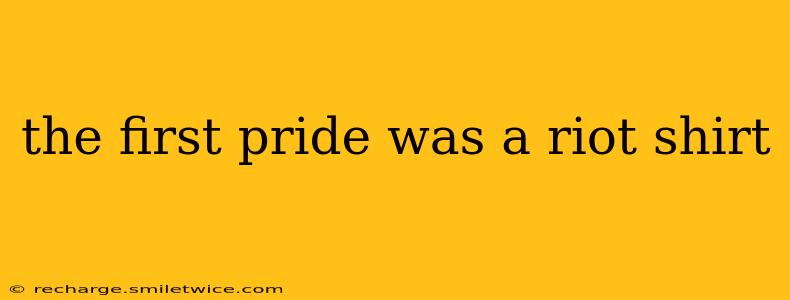The phrase "the first Pride was a riot" isn't just a catchy slogan; it's a powerful statement reflecting the crucial role of the 1969 Stonewall Uprising in igniting the modern LGBTQ+ rights movement. This wasn't a peaceful march; it was a spontaneous rebellion against systemic police brutality and societal oppression that fundamentally altered the course of LGBTQ+ history. This article delves into the events of Stonewall, its significance, and its lasting impact on Pride celebrations worldwide.
What Happened at Stonewall?
The Stonewall Inn, a gay bar in New York City's Greenwich Village, was frequently raided by police. These raids, commonplace at the time, were often brutal and discriminatory. However, the raid on June 28, 1969, sparked something different. Tired of the constant harassment and violence, patrons and neighborhood residents fought back. The uprising lasted for six days, marking a pivotal moment of resistance and defiance.
This wasn't a planned protest; it was a spontaneous eruption of anger and frustration born from years of marginalization and violence. The police brutality, combined with the community's collective weariness, fueled a rebellion that became a symbol of LGBTQ+ resistance. The Stonewall riots marked a shift from passive acceptance to active defiance.
Why Was Stonewall So Important?
Stonewall's significance transcends the immediate event. It served as a catalyst for several crucial reasons:
-
Birth of LGBTQ+ Activism: Before Stonewall, organized LGBTQ+ activism was largely limited. The riots galvanized a generation of activists, leading to the formation of numerous LGBTQ+ rights organizations and the rise of more visible and vocal activism.
-
Increased Visibility and Awareness: The widespread media coverage, though initially often negative, brought the plight of LGBTQ+ people into the national consciousness, generating crucial conversations about equality and human rights.
-
Embracing the Power of Collective Action: Stonewall demonstrated the power of collective action and resistance against oppressive systems. It showed that fighting back could lead to meaningful change, inspiring future generations of activists.
-
Shifting the Narrative: The riot challenged the dominant narrative portraying LGBTQ+ people as passive victims. It demonstrated resilience, courage, and a fierce determination to fight for their rights.
Was Stonewall the First LGBTQ+ Protest?
While Stonewall is widely recognized as the watershed moment that ignited the modern LGBTQ+ rights movement, it wasn't the first LGBTQ+ protest. There were earlier instances of activism and resistance, often smaller in scale and less widely documented. However, Stonewall's impact was unparalleled in its scale, lasting consequences, and influence on future LGBTQ+ activism.
How Does Stonewall Influence Pride Today?
Today's Pride celebrations are a direct consequence of the Stonewall Uprising. While many Pride parades are joyous celebrations, they also serve as a powerful reminder of the struggle for LGBTQ+ rights and the ongoing fight for equality. The riot's legacy is ingrained in the spirit of Pride, highlighting the importance of resistance, visibility, and collective action. The vibrant and often radical nature of many Pride events directly reflects the rebellious spirit of Stonewall.
What Lessons Can We Learn From Stonewall?
Stonewall teaches us the crucial importance of:
-
Active Resistance: Passive acceptance of oppression rarely leads to meaningful change. Active resistance, even in the face of overwhelming odds, is crucial for achieving social justice.
-
Community Solidarity: The collective action of the Stonewall community demonstrated the power of unity and solidarity in fighting for social change.
-
The Importance of Remembrance: Remembering the past, acknowledging the struggles and sacrifices made by previous generations of activists, is essential for continued progress.
The statement "the first Pride was a riot" isn't simply a historical fact; it's a call to action. It reminds us that Pride is not just a celebration; it’s a testament to the ongoing struggle for LGBTQ+ rights and a commitment to continuing the fight for a more just and equitable world. The legacy of Stonewall serves as a powerful reminder of the courage and resilience required to achieve lasting social change.
